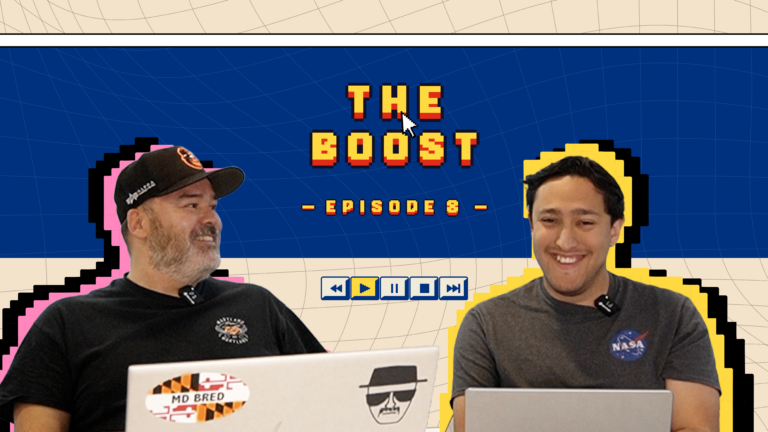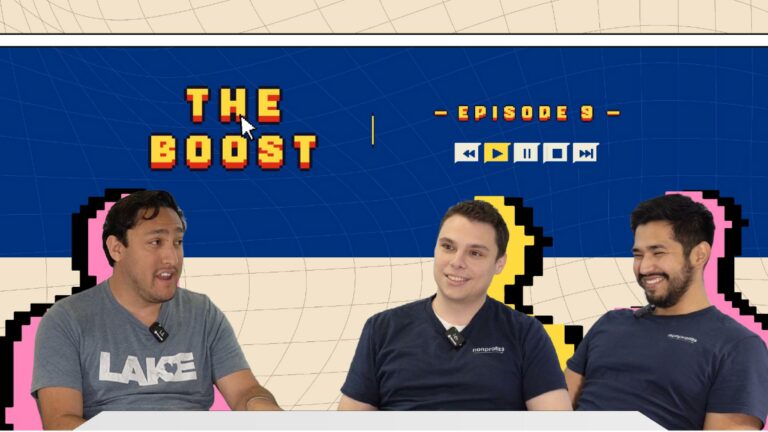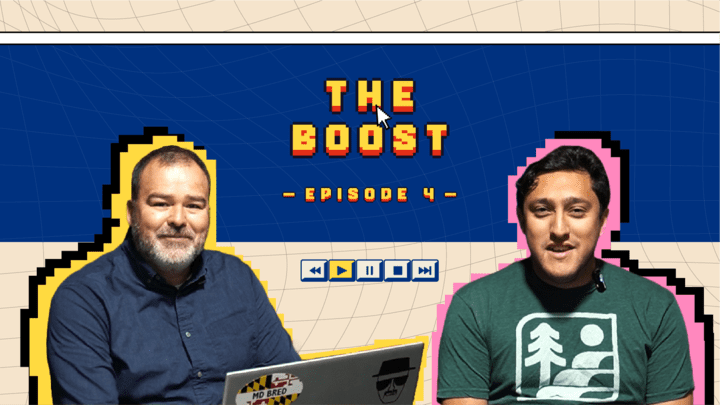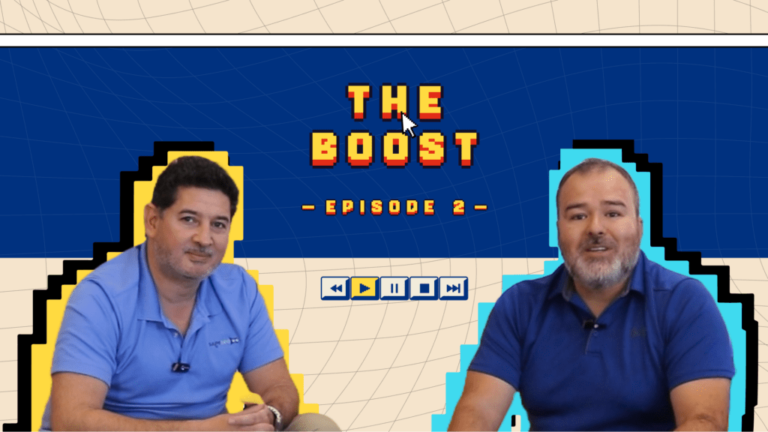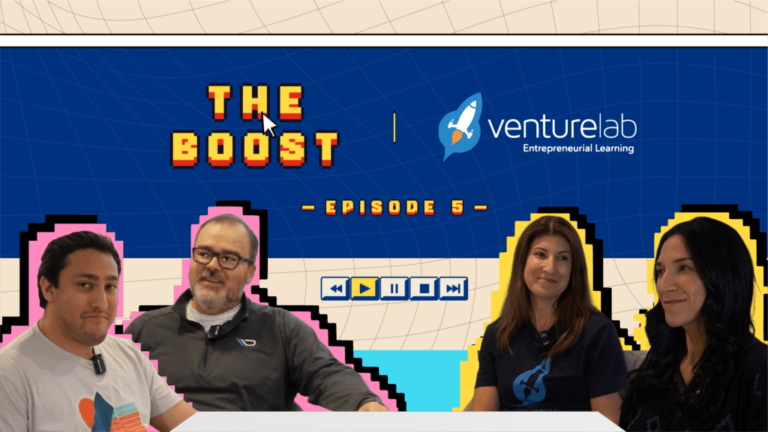In this episode of The Boost, hosts Pablo and Leon sit down with Jay Rebaldo from Rebaldo Realty Group to talk about the world of real estate. Jay shares his journey from building and developing teams in the corporate world to his passion for real estate, which led him to establish his real estate team. Operating within a small team alongside another licensed agent, Jay discusses the unique operations of Rebaldo Realty Group, affiliated with Keller Williams City View. We discuss the state of the San Antonio real estate market. Jay addresses the impact of higher interest rates and observes the market’s shift towards a buyer’s market, offering valuable insights for both buyers and sellers. Jay provides practical advice for navigating the real estate landscape. Additionally, listeners are invited to an upcoming Lunch and Learn event to gain further knowledge on buying, selling, and mortgage updates.
Hosts:
Pablo Calvo: Linkedin
Jay Rebadlo: Facebook
Podcast:
Hosts:
Pablo Calvo: Linkedin
Find Us:
YouTube: https://www.youtube.com/@TheBoostChannel
Spotify: https://open.spotify.com/show/2AHGT1Aoq9oAHZEHeORBpa?si=1cea25e611bb4ec6
Apple Podcasts: https://podcasts.apple.com/us/podcast/the-boost/id1720047128
Facebook: https://www.facebook.com/TheBoostChannel
Website: https://theboost.fm
Getting Into Real Estate:
- Jay’s Background: Jay discusses his transition from building and developing teams in the professional world to venturing into real estate.
- Transition to Real Estate: Eight years ago, Jay became more passionate about real estate and decided to build a business in the field due to his experience in sales and investing.
About Rebaldo Realty Group:
- Small Team Operations: Jay operates a small team alongside another licensed agent, with support staff like marketing and transaction managers.
- Affiliation: Rebaldo Realty Group is affiliated with Keller Williams City View, providing extensive support and resources.
State of the San Antonio Real Estate Market:
- Impact of Higher Interest Rates: Jay discusses the challenges posed by higher interest rates, leading to consumer hesitation, but emphasizes the potential benefits for informed buyers.
- Market Shift: Observations on the market shift towards a buyer’s market, evidenced by factors like days on the market and inventory levels.
- Trends: Decline in home sales contrasted with rising home prices; discussion on factors like interest rates and pandemic effects.
Advice for Buyers:
- Importance of Pre-Approval: Jay emphasizes the importance of getting pre-approved for a mortgage before starting the home-buying process.
- Steps in Home Buying: From consultation with a real estate agent to securing financing and navigating the negotiation process, Jay outlines the steps for buyers.
Advice for Sellers:
- Preparation for Listing: Sellers are advised to prepare their homes for listing, including home assessments, repairs, and setting a competitive price.
- Negotiation Process: Jay explains the negotiation process for sellers, including reviewing offers and managing contingencies.
Investment Property Strategies:
- Types of Investments: Discussion on various investment strategies, including buying second homes for rental, flipping properties, and investing in multi-family properties.
- Financial Considerations: Jay emphasizes the importance of assessing cash flow and financial viability when considering investment properties.
Upcoming Event:
- Lunch and Learn Event: Jay invites listeners to a Lunch and Learn event on March 1st at Bell Oaks Community Center, covering topics like buying, selling, and mortgage updates.
- Partnerships: Event will feature partnerships with Direction Home Loans and Sitterle Homes.
End of Show:
- Hosts thank Jay for his participation, and Jay reciprocates the gratitude.
- Jay extends a welcome to the Keller Williams City View office, where Rebaldo Realty Group operates.
- Hosts sign off and remind listeners to tune in to the next episode of The Boost.
Pablo (00:00):
Join us for another episode of The Boost as we sit with Rebaldo Realty Group. Welcome to another episode of The Boost. I’m Pablo. And I’m Leon. Join us as we sit with Jay Rebaldo from Rebaldo Realty Group. Jay, thank you so much for joining us today.
Jay (00:19):
Thanks, Pablo. I appreciate you having me here, Leon.
Pablo (00:23):
So Jay, tell us how did you get into real estate as a career?
Jay (00:26):
Alright, thanks. So basically for all my career, all my years, it is been in the professional world. I’ve been building and developing and scaling large teams for different companies. And throughout that time I’ve dabbled with some real estate investing, passive investing with multifamily, also a single family flip and doing rental. And so just eight years ago I started becoming more passionate about it and decided that perhaps this is something I can do and build a business in real estate.
Pablo (01:02):
So you’ve had a lot of years in sales, so it just became a natural transition.
Jay (01:06):
Absolutely, because real estate is really about sales and relationship and now we’re dealing with something that will never depreciate and always just appreciate.
Pablo (01:16):
So you made the jump into real estate and now you’ve started Rebaldo Realty Group. Tell us about that. Yeah,
Jay (01:22):
So Rebaldo Realty Group, I run and operate a small team with another licensed agent and we have a team internally, marketing transaction manager, listing coordinator, and our business licenses here with Keller Williams City View, which we get a ton of support and one of the best brokerages here in town.
Pablo (01:47):
Well, that’s an amazing transition and I’m sure you’re going to do amazingly as well. So tell me, I mean, it’s a challenging time in the real estate market. Could you tell us a little bit more about the temperature of what’s happening in San Antonio? Yeah,
Jay (02:00):
Well, so in the past year I think we can all agree that we’ve felt the higher interest rates and the results of that is people are holding still. There’s a lot of consumer confidence that’s been shaken up and with the interest rates climbing through pass through the 7% and even touching the 8% interest rates. So it is been tough, but then again, we’ve had the once in a lifetime pandemic, which really caused this. So it’s quite an anomaly and people got used to the lowered interest rates, some twos, maybe threes. So now when they’re seeing the aids, they’re like, oh no, it’s the end of the world. No, not going to do it. But in reality, we’re actually just in a normal state if you look at more of the past 20 years. And likewise though, as interests have gone up in the past year, the home prices dipped a little bit, but then as now we’re into 2024, we will touch on the turnaround on that with the forecast.
Pablo (03:09):
So with the interest rates the way that they are, how has that impacted potential buyers in your estimation?
Jay (03:18):
Absolutely. I think buyers are holding still, as I mentioned, and they’re asking is it the right time? And my common response is, well, the interests are higher, but also the seller are very motivated. And so when the sellers are motivated, the buyers have more of the leverage to negotiate on that. And yes, you might have a higher interest rate than you desire, but you know that the home prices are in your favor and then later on you could definitely refinance as things turn around. So that’s been a very good strategy for a lot of informed buyers.
Leon (03:58):
So buyer’s market right now, like 20, 24 buyer’s market,
Jay (04:03):
In a way, it is shifting to the buyer’s market. So we’re still going through the shift, I cannot say indefinite, that yes, it’s a buyer’s market, but there’s a lot of indicators and signals that tell us it’s in the shift. So we’ll touch on things such as the days on market, the inventory, those are the things that we look at. And watching the shift of the market move, could
Leon (04:27):
You talk about the differences you’re seeing today compared to 2023 and even previous years?
Jay (04:34):
So if we look at just the past five years, there’s been a decline in home sales, I’d say from 2021, right? Coming out of pandemic to today, there’s been about 20% decrease in home sales, yet the home prices have steadily rose along the inflation, which is 3%. Now, when I look at pre pandemic in 2018, the home values have gone up 45%. And even with the sales back then to now, even though it’s decreasing in sales, the home values are still going up to offset that. Just last year, I believe there’s about 45,000 new listings of homes going on sale. As I mentioned earlier, Pablo, the inventory is a good gauge, and right now we’re sitting at about four and a half months worth of inventory. So that means for the sellers, they’re putting up their house for sale, it’s sitting on market longer, roughly about 74 days before there is a closed contract. And so between the 74 days of houses sitting on market, four and a half months of inventory. So now buyers know they could choose from many different homes. And another factor coming in here is that the new construction, the new builds, they’re a big strong force in their real estate market because they’re pumping out houses a lot faster and quicker than preexisting homes.
Leon (06:21):
Interesting. Yeah, because you look around San Antonio, there’s construction everywhere, roads and commercial buildings, but there is a neighborhood on every single corner. Is that helping with kind of the shortage, I guess, of homes?
Jay (06:40):
Well, I mean as far as the availability of pre-owned homes, it’s increasing, right? Again, four and a half months. So if there was no additional houses to go up on sale, it’ll take us four and a half months for every single homes to be sold. And the fact that they’re sitting longer, what a lot of consumers or buyers are doing is they’re looking to new builds because now new builds are able to get more aggressive. They have a lot more incentives in turning those inventories in which a lot of buyers are identifying that and saying, I’d rather go save here, go out further and relocate and get the right deal for them.
Pablo (07:25):
Okay. That’s a stark difference from my own experience. I mean, I’m a transplant from Baltimore to San Antonio back in 2018, and I remember when my wife and I were looking for just homes for rent, we couldn’t find anything. We spent months just looking at different neighborhoods, looking at opportunities to try to be close to downtown sa. And compared to today where I think the script has flipped quite a bit, however, what I am noticing and now being a homeowner in San Antonio is I’ve always concerned myself with man, did I make the right decision buying a home back then because I always worry that the values of the homes will drop. Well, the exact opposite has happened. And then I also look back at the timing that particular time, the rates are very good. So now I’m not going anywhere on my side. However, it’s pretty tempting when you see how much the value of the home is appreciated in such a short period of time. So as I’ve been thinking about how I’ve been told in real estate professionals is always that there’s never a bad time to buy because you can always refinance as rates start taking a dip, right? That’s
Jay (08:42):
Right, absolutely. And like you Pablo, when you bought a couple years ago, it was quite scary. But now that you look back, you and your wife were probably high fiving each other and said, man, that was the smartest move. a lot of people have benefited in the increase of values of homes coming out of pandemic. And so now they had the lower interest rates, their houses are valued more, they have more equity. So that also plays a factor of what a lot of buyers or even investors are now plan to do moving forward. And in my opinion, it’s probably in their favor. They have options. They can take the equity and reinvest it somewhere else, or they could either buy a new home, move to relocate. So those are a couple options, and I think we can touch on that a little bit more later.
Pablo (09:38):
Great,
Leon (09:38):
Thank you. So if you had magic crystal ball and you wanted to do some forecasting, some predictions, what are your expectations on 2024 and maybe even a little bit further?
Jay (09:53):
So I don’t have a crystal ball, but I did attend the 2024 housing forecast by the San Antonio Board of Realtors. And so everything from the data that we’re seeing and also from what I am receiving being out on the field with clients, is that there is a good energy. Right now we’re in February, March going into March and buyers are coming out. So we experienced a 20% decline in sales from last year, but we see going into the summer there will definitely see about a double digit increase of sales, 10% plus more on buyers. Now transacting going into 2024,
Leon (10:37):
Is that related to some of the interest rates? Like Fed just did a pause, no increase, no decrease. Is that playing some part of it?
Jay (10:46):
Well, I think so. And not to get political, but it is election year, and so those are always huge drivers and simulation into the interest rate. And so now we are seeing mortgage interest rates go into the sixes, even into the high fives, often by depending on credit score, obviously mortgage lenders will have these discussions, but from what I’m seeing within my clients is I’m seeing a lot of that. And also there’s a lot of incentives to where you could buy down the rates to where first time homeowners, they could literally get approved for interest rate, maybe even high fours if not low fives. So yeah,
Leon (11:34):
I’m in a new construction neighborhood and that’s what I see. I see fives advertised. I also see they’ll give you the kitchen sink, the fridge, the blinds, everything. Is some of the new builders influencing that is helping the market in the end?
Jay (11:52):
I think so. As of today, it’s a little bit harder to compete with builders because they have that economy of scale to buy down the rates. So a lot of agents may feel that it is easier to take some of their buyers who are willing to relocate further out and go to a builder than going into the new sale, existing home sales or using homes. And it’s just hard because the sellers, those owners, they’re not able to cut their prices or offer that. And that’s why it’s a little difficult. But going into the forecast, I believe that we’re going to start seeing preexisting homes, resales come right back up again. Okay,
Leon (12:37):
Alright. One thing realtors have always told me, especially when I was hunting, was new home builds or always more expensive? Is that a true thing or is that more of a myth?
Jay (12:53):
It’s hard to say if they’re more expensive because catch 22, you come with a warranty, it has a lot of benefits that you won’t need to put money into it for at least five to 10 years. So there’s a positive there, but if you look at it from a different lens to where with preexisting homes or pre-owned homes, they’ve also, a lot of homes have already done the upgrades as well. So in that customization, correct, that if the buyer and the seller just matches, then it’s like a big win, right? It’s like, oh, this has exactly what I was looking for, and so therefore they don’t have to incur that.
Leon (13:35):
So I’m out in Seguin, Pablo’s near downtown San Antonio, we’re on the northwest side of town. What are the hottest markets within the San Antonio area for home buyers and sellers?
Jay (13:47):
Well, first off, Leon, congratulations for moving out to Sine because that’s definitely one of the fastest growing towns or area cities around the metropolitan of San Antonio. Good job. So if we look at San Antonio as a whole, and there’s 1604, looking at the map west of San Antonio, outside of 1604, that’s probably one of the hottest growing residential part of San Antonio. On the way to Castroville, there’s a lot of development, a lot of homes going
Leon (14:21):
Up, which is called Alamo Ranch area, right?
Jay (14:26):
Yes. And then more east going into like 90, 1604. And then as you look at the map still and you go north and then East- New Braunfels and Seguin, that’s probably those two are the second and third fastest growing areas of San Antonio as you know that. But within closer to San Antonio, I’d say Cibolo, Converse, Schertz, St. Hedwick, Boerne, maybe not so much Boerne, sorry, Bulverde. Those are also where a lot of people are migrating. And I think it touches on what we said that San Antonio is growing. So to grow, you got to go further out, and you’ll notice that what 1604 is today, in 10 years, 46 is going to be the new outer loop.
Leon (15:19):
So everybody’s moving further away. And that’s kind of the relation to the combining of Metroplexes from Austin to, I guess you’d call San Marcos, New Braunfels in San Antonio. That’s right,
Jay (15:31):
That’s right.
Pablo (15:32):
So if you were a buyer today, what type of advice would you give them as they start their journey into the home buying process?
Jay (15:42):
The first thing I’m going to say is congratulations on taking this journey. It is a journey. Buying a home is probably one of the most expensive purchases that most people will ever make in their life. So consult with a professional, a licensed real estate agent or a realtor more preferably. And after you consult with a realtor, that’s going to be the discovery meeting, needs analysis, kind of like a mutual interview of what the client and the agent is going to accomplish and walk through the expectations.
Leon (16:18):
Real quick on the realtor, real estate, real estate agent, what’s the difference on that?
Jay (16:26):
Great question. I’m glad you asked that. So in Texas, after going through schooling, you take a test and then you become licensed in the state of Texas that makes you a real estate agent. And now realtor means you are a member of the board, San Antonio Board of Realtors, Texas Realtors or the National Association of Realtors. And what that provides you is an immense amount of resources and support from the board. And so also intensive, additional intensive training. And so you’re just in a way, a little bit further up on the expertise and resource that you have available to you. And you’ll notice realtors, it’s a trademark. It’s a brand that belongs to the NAR, National Associations of Realtors.
Leon (17:24):
So if I was a buyer today, would you recommend a realtor of a real estate agent? I know it’s a
Jay (17:31):
Toughy question. I may sound biased, but of course I’m going to say yes, only just going, looking back at all the training and the resource that I have within my disposal. Absolutely.
Pablo (17:42):
So if a new buyer is starting this process and what’s the first thing that they should do? Maybe as they talk to you or prior to speaking to you, what’s the best approach for them?
Jay (17:55):
We would definitely recommend the buyer to go seek and meet with a mortgage loan officer to get pre-approval. That is paramount, because at least this way we know what the reality is. And then as we do the home searches, we’re staying within those means of financial visibility. And after the searches, we’re going to go see these properties, and once we see the properties and analyze which ones we want to make an offer, definitely make an offer. And then from that offer, there’s going to be a negotiation. And once that negotiation’s being reached, you go under contract as a buyer. And then in that process, a normal option period, which means you have, let’s just say on average seven, maybe 10 days to where you’ll do an inspection of the home, you’ll maybe look at the survey. So the buyer, this is what we also call, or many will call due diligence because within that time option period, then you’re able to say, yes, I like it, or actually no, don’t like it.
(19:03):
And then that would open up some additional negotiation, should there be things identified from there. And also within the contract period. After that, then you are securing your financing with your loan officer. And I would say average timeline would be 30 to 45 days from contract going on to the close. And then the big special day of close date is when everything gets put in place with your title, and then the title will facilitate the transaction. They are the facilitator and the middle person that will make the exchange. And after it’s signed and then it’s funded from your financing institution, then you’re good to go. You get the keys.
Leon (19:55):
Very nice. So on the flip side, if I’m a seller, do you have some advice or how should I go about that part?
Jay (20:03):
Alright, so as a seller, likewise, you’re going to go meet with a real estate agent or a realtor and basically discuss with them what you’re trying to do as you sell this home. There’s multiple reasons, whether it’s family relocating, military, or you want to sell it and buy a new home. So there’s that consultation process there. And the agent would then assess your home, do some intensive comparative market analysis of the home, evaluate the house physically, and see what are the things that could definitely be done to make it be show ready. And then from there, once the assessment is completed, then the client and the agent will agree on a sales price list price. And then you go into, once you secure the listing agreement, you then go to the listing preparation and getting it ready to be marketed publicly. And the agent’s job is to definitely market it and get it out there and get a lot of showings, host, open house, get a lot of visibilities, and now that you’re a seller, then you’ve got the buyer side who will then view it and then they’re going to make their offer. Then you’re going to review the offer and go through the negotiation. So in this side, we’re literally looking at the other side of the table. So as a seller, you are now evaluating the offer and if you like it, you approve it and then the buyer will do their side. And then for the seller, you then go through and just kind of continue to do your due diligence, but at the same time, once the option period is achieved, then you’re going to sit and wait till the closing date and so on.
Leon (21:54):
That makes sense. a lot of folks that own a house already, they’re going to also be selling, maybe buying. How does that process work? I’m going to throw a curve ball in there.
Jay (22:08):
There is a term that we use called contingency. If I’m a homeowner and I’m going to sell my home to buy that next home and I need my home to sell first, then me as a buyer would present an offer that this offer is contingent on me selling my home first. It’s a very timely orchestrated type transaction because they’re dependent of each other, which happens very often as well that a seller in parallel being a buyer. But I think when done right and planned, it goes pretty smooth, but there are times when it doesn’t. But again, the professional will be the one to guide you through that.
Leon (22:55):
Okay,
Pablo (22:57):
So I have a follow up question. And so I’ve sold properties in the past, and one of the things that I did in that process was I had a home inspection done as a seller to know what to get ahead of prior to that process. And what that did for me is of course a buyer’s going to have their own home inspection performed. However, when you’re doing the sale and you show that home inspection upfront and you show the things that you’ve addressed upfront, it changes the dynamic of the comfort for the buyer because they feel like someone is proactively handling it on their dime to make sure that this is as smooth of a transition as possible. Mind you, even with realtors involved, it gives the, I always get confused, is it listing agent? Is it a listing agent for the seller? For the seller? For the seller, okay. So the listing agent, it gives them just one more tool in the arsenal to get more interested parties because it is showing that someone is motivated but also thorough. Would you say that that’s potentially a good approach?
Jay (24:10):
It’s a fantastic approach because on top of you proactively getting an inspection done and then correcting or repairing those issues identified in your home, that gives the confidence to the selling agent or the buyer’s agent for the client to show, look, this has already been done. And on top of that, you can include that in your seller’s disclosure because a lot of buyers would review that first to see what else is in this house other than what I’m seeing on the pictures. So great job on that. Yes, it’s a little bit of an investment, but I think speed to sell makes up for what you just invested in that inspection
Pablo (24:53):
Because I think that that tug of war and that negotiation process requires you to drop your price. It requires a lot of things that I’m sure most sellers don’t want to have to do because even though it’s just a number on a sheet of paper, it’s real money that you’re not taking home.
Jay (25:08):
Agreed. And good point on touching on that, because you’re basically balancing maximizing your margin or your sale price and your walkaway price with time and convenience. Time and convenience means you got to sacrifice some of the dollars, but if you want to maximize some dollars means you got to spend more time and maybe do more work so only the client like yourself would be able to determine where am I in that?
Pablo (25:39):
Sure, thank you.
Leon (25:41):
We talked buyers, we talked sellers, we talked some strategies. There is a third portion of this that I think more and more folks are looking at is, if I own a home already, I want to buy that investment property. I want to branch out, I want to be able to build generational wealth in some extent. What would you advise families or walk them through the process on looking at an investment property?
Jay (26:09):
I really like this question lean and thanks for asking that. When my friends and clients family talk about investment, the first thing I do is investor has such a big word when really as you described it, I’m just a normal guy that when I buy another house, right? So when I’m having these conversations, I really try to dig deep on why you’re asking the question. I want to know what is the motivation? What is the objective? What is the goal of the client? So there’s multiple ways to purchase your second home and make it be an investment or purchase your next residential home and make your existing home be the rental. So there’s multiple ways of doing that. And also part of investing is flipping the word flip means you go purchase a home that needs some tender loving care or some touch, you purchase it much lower, and then you then manage the general contractor that would basically make all the necessary upgrades, updates onto the home. So that means you’re going to put in more money into that project depending on the current state of the home. And after that, your trusted realtor will then sell it for you considering the repairs that you’ve put in and also matching up with the current market analysis within that neighborhood. And so ideally you would walk away with your margin that you’re hoping to do.
Leon (27:52):
Sorry. So there’s the buy second home rented out, there’s buy move, and then rent out second the first home, and then there’s the flipping. Is there any other methods? I’ve seen a ton just on the TikTok and Instagram, buy a duplex, rent out one side. Is there even multifamily?
Jay (28:16):
Absolutely. Multifamily, multi doors, apartment complexes, duplex, triplex, quadplex. Those are very, very common. And yes, renting out those doors in my mind, you get to a point to where it becomes passive, which I myself have experience in passive investing with the multifamily. But one thing I want to touch on, let’s go back to buying your second home. I have clients that are a handful of clients that are doing the same thing that I’m guiding ’em through. This is if you buy a home but have no plans of moving out, you and your wife love it there, but you want to buy a new home. a lot of things that I would look at is I’m going to do a comparative market analysis on rentals. What is the rental in that area that you’re looking at? You determine what is the average price for rent, and then you then look at the home when you make the purchase, well, the mortgage offset it, will you be cashflow positive? That is one easy way to do that. The thing to consider is because it’s not your residential, it’s an investment, it will then be a conventional loan unless you just have the cash.
Leon (29:35):
So conventional loan more money, what’s the
Jay (29:38):
20% down payment? Minimum. Minimum. Some creative financing might be 15, but let’s just say 20% is a good rule of thumb, a little higher interest on that. But then you could then invest and buy that home and then rent it some other folks to where, Hey, it’s time for us to move to a new home. Our family’s growing. So you have equity in your initial residential home, you buy the new home, move in, then you can take advantage of FHA government backed loans, VA or USDA, all those different programs that’s available and talk to your mortgage officer, loan officer for that. And then so now with the existing home, when you turn it into a rental, then you’re able to again capitalize on the residential programs for your second one and then turning the first one into a rental to where it’s becoming cashflow positive. When you talk to others, you might hear them stay in the second home for two years and then do it again. So rinse and repeat. And that’s how many people are building their portfolio that way.
Pablo (30:50):
Thank you. You’re giving us a full education in the real estate process, almost want to buy another home now That is right. Exactly. You have a lunch and learn event coming up on March 1st, Friday, March 1st from 11 to two at the Bell Oaks Community Center. Tell us more about what you’re going to show people that.
Jay (31:12):
So that’s actually in a week or two. So I welcome you and our viewers to come join and on this Lunch and Learn on this day, we invite buyers, sellers, or even the lookers to come. We have partnered with Direction Home Loans, Michael Kidd and also Johnny Martinez with Sitterle Homes. They have welcomed us in the Bell Oaks community very well sought after renowned community and to be in their model home so that we can host a lunch and learn on the buying selling process. We will go deeper into that, but more importantly, also building on your lot, which is also another common thing for families to where I want to go buy out there, sit on it, but I want to build later on. And then we’ll go deeper on mortgage rates, excuse me, mortgage update in the market today directly from Michael Kidd.
Pablo (32:12):
Wonderful. Thank you very much. Well, I’d love to have you again in the future, I’m sure as the market gets even hotter with the rates changing, there’ll be plenty to talk about as the market dynamics of course will change, as we all know. Thank you so much for joining us on the Boost.
Jay (32:29):
Thank you. Thank you, Pablo. Thank you, Liam, for inviting me here.
Pablo (32:33):
Thank you.
Jay (32:34):
And thank you for hosting. Yes, absolutely. Yes, absolutely. And you guys are always welcome here at the Keller Williams City View office, in which my Rebaldo Realty Group is officing out of here. Great resource.
Pablo (32:48):
Thank you very much. Thank you for joining us for another episode of The Boost. If you need to reach Jay Aldo, the information will be down below.
Leon (32:56):
And then if you want to find us, we have a new domain, the Boost fm.
Pablo (33:02):
Remember like subscribe, and we’ll see you on the next episode of The Boost.
Jay (33:06):
Bye.

